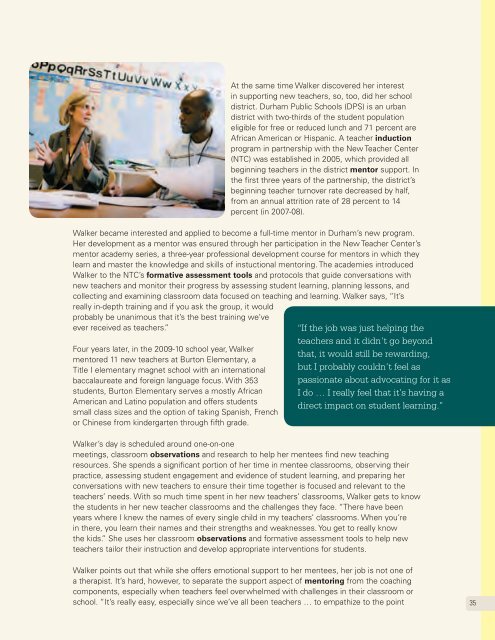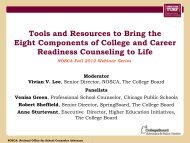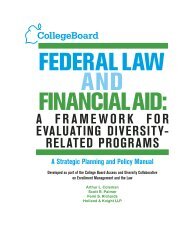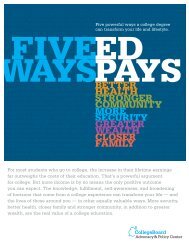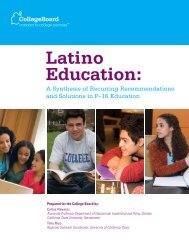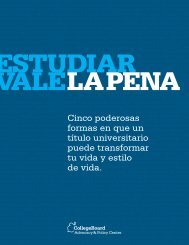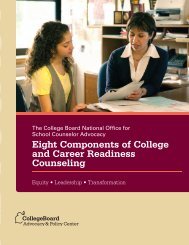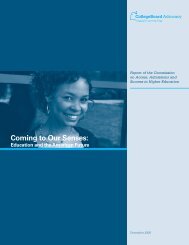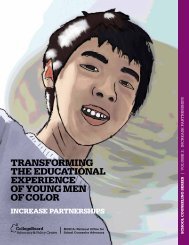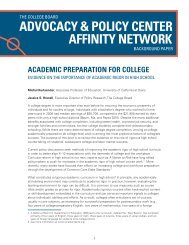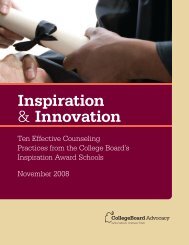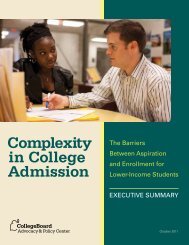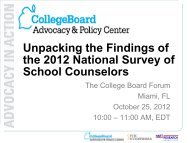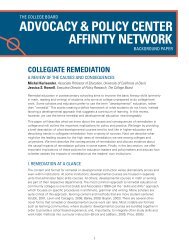Teachers Are the Center of Education: - New Teacher Center
Teachers Are the Center of Education: - New Teacher Center
Teachers Are the Center of Education: - New Teacher Center
Create successful ePaper yourself
Turn your PDF publications into a flip-book with our unique Google optimized e-Paper software.
At <strong>the</strong> same time Walker discovered her interest<br />
in supporting new teachers, so, too, did her school<br />
district. Durham Public Schools (DPS) is an urban<br />
district with two-thirds <strong>of</strong> <strong>the</strong> student population<br />
eligible for free or reduced lunch and 71 percent are<br />
African American or Hispanic. A teacher induction<br />
program in partnership with <strong>the</strong> <strong>New</strong> <strong>Teacher</strong> <strong>Center</strong><br />
(NTC) was established in 2005, which provided all<br />
beginning teachers in <strong>the</strong> district mentor support. In<br />
<strong>the</strong> first three years <strong>of</strong> <strong>the</strong> partnership, <strong>the</strong> district’s<br />
beginning teacher turnover rate decreased by half,<br />
from an annual attrition rate <strong>of</strong> 28 percent to 14<br />
percent (in 2007-08).<br />
Walker became interested and applied to become a full-time mentor in Durham’s new program.<br />
Her development as a mentor was ensured through her participation in <strong>the</strong> <strong>New</strong> <strong>Teacher</strong> <strong>Center</strong>’s<br />
mentor academy series, a three-year pr<strong>of</strong>essional development course for mentors in which <strong>the</strong>y<br />
learn and master <strong>the</strong> knowledge and skills <strong>of</strong> instuctional mentoring. The academies introduced<br />
Walker to <strong>the</strong> NTC’s formative assessment tools and protocols that guide conversations with<br />
new teachers and monitor <strong>the</strong>ir progress by assessing student learning, planning lessons, and<br />
collecting and examining classroom data focused on teaching and learning. Walker says, “It’s<br />
really in-depth training and if you ask <strong>the</strong> group, it would<br />
probably be unanimous that it’s <strong>the</strong> best training we’ve<br />
ever received as teachers.”<br />
Four years later, in <strong>the</strong> 2009-10 school year, Walker<br />
mentored 11 new teachers at Burton Elementary, a<br />
Title I elementary magnet school with an international<br />
baccalaureate and foreign language focus. With 353<br />
students, Burton Elementary serves a mostly African<br />
American and Latino population and <strong>of</strong>fers students<br />
small class sizes and <strong>the</strong> option <strong>of</strong> taking Spanish, French<br />
or Chinese from kindergarten through fifth grade.<br />
“If <strong>the</strong> job was just helping <strong>the</strong><br />
teachers and it didn’t go beyond<br />
that, it would still be rewarding,<br />
but I probably couldn’t feel as<br />
passionate about advocating for it as<br />
I do … I really feel that it’s having a<br />
direct impact on student learning.”<br />
Walker’s day is scheduled around one-on-one<br />
meetings, classroom observations and research to help her mentees find new teaching<br />
resources. She spends a significant portion <strong>of</strong> her time in mentee classrooms, observing <strong>the</strong>ir<br />
practice, assessing student engagement and evidence <strong>of</strong> student learning, and preparing her<br />
conversations with new teachers to ensure <strong>the</strong>ir time toge<strong>the</strong>r is focused and relevant to <strong>the</strong><br />
teachers’ needs. With so much time spent in her new teachers’ classrooms, Walker gets to know<br />
<strong>the</strong> students in her new teacher classrooms and <strong>the</strong> challenges <strong>the</strong>y face. “There have been<br />
years where I knew <strong>the</strong> names <strong>of</strong> every single child in my teachers’ classrooms. When you’re<br />
in <strong>the</strong>re, you learn <strong>the</strong>ir names and <strong>the</strong>ir strengths and weaknesses. You get to really know<br />
<strong>the</strong> kids.” She uses her classroom observations and formative assessment tools to help new<br />
teachers tailor <strong>the</strong>ir instruction and develop appropriate interventions for students.<br />
Walker points out that while she <strong>of</strong>fers emotional support to her mentees, her job is not one <strong>of</strong><br />
a <strong>the</strong>rapist. It’s hard, however, to separate <strong>the</strong> support aspect <strong>of</strong> mentoring from <strong>the</strong> coaching<br />
components, especially when teachers feel overwhelmed with challenges in <strong>the</strong>ir classroom or<br />
school. “It’s really easy, especially since we’ve all been teachers … to empathize to <strong>the</strong> point<br />
35


